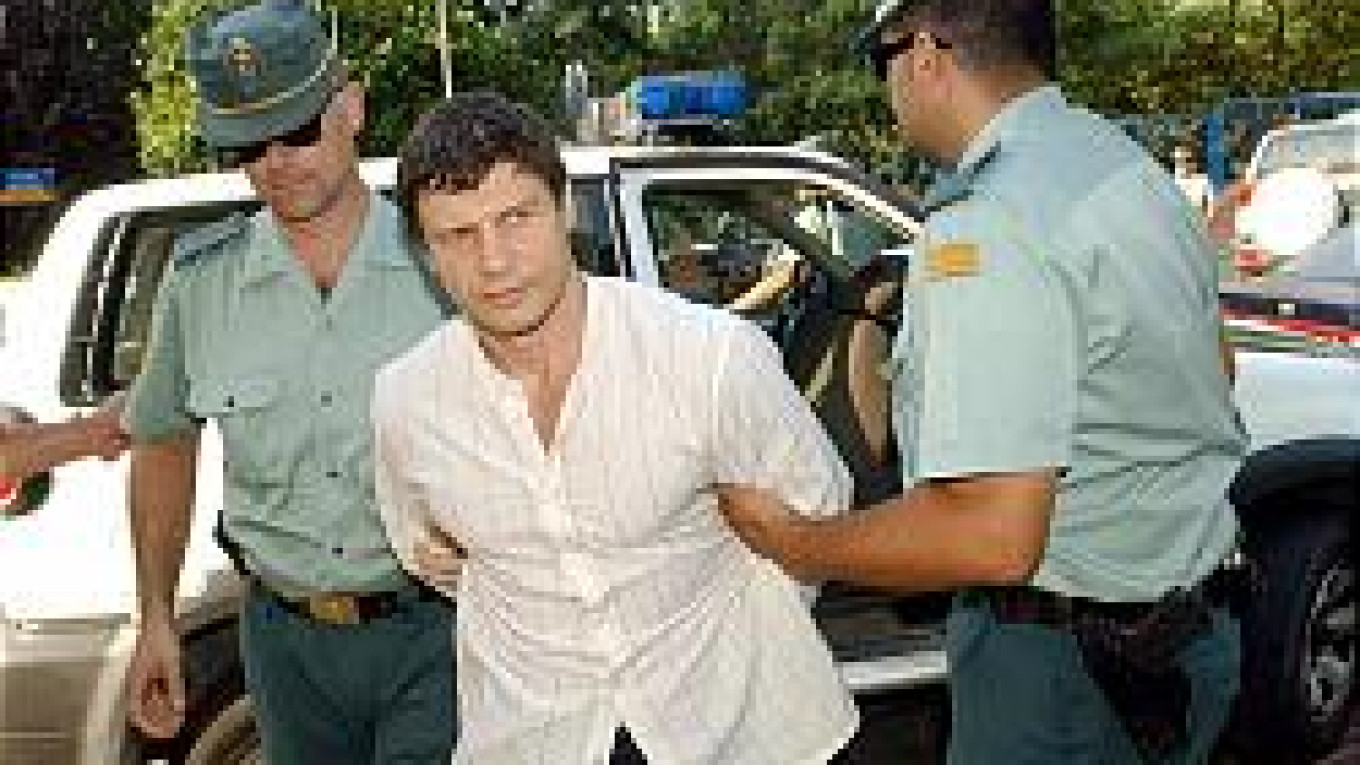Andrei Pylev, who reportedly is known in the Russian underworld as Karlik, or the Dwarf, oversaw the finances of one branch of Moscow's once-powerful Orekhovskaya organized crime grouping, city police said. His brother, Oleg, who was extradited last year from Ukraine and is in custody in Moscow, supervised the hit men, the police said.
Acting upon the Interior Ministry's request and accompanied by a senior Russian police officer, officers of the Spanish gendarmerie arrested Andrei Pylev, 40, at his luxurious villa in the elite resort of Marbella last Thursday.
Four more people were detained along with Pylev, including three Russians and a Spaniard, Kommersant reported Saturday.
The Prosecutor General's Office has requested the extradition of Pylev, who is being held in a Spanish detention facility, a spokesman for this office said. Neither the spokesman nor officials at the office's international legal department, which is responsible for extradition, would comment on the status or prospects of the request.
An official at the Moscow city prosecutor's office was more forthcoming. "In fact, the rumor here is that he will be handed over," the official, speaking on condition of anonymity, said Monday.
In a statement announcing the arrest, the gendarmerie of the Spanish province of Malaga said that Russian authorities suspect Andrei Pylev of a number of crimes, including involvement in the killing of one of Russia's most notorious assassins, Alexander Solonik.
Neither federal nor city prosecutors would confirm that Pylev is suspected of involvement in murder. According to an official in the Moscow police force's criminal investigation directorate, Pylev oversaw the finances of the Orekhovskaya grouping's Medvedkovskaya branch, whereas his brother supervised the hit men.
Pylev and his lawyer could not be reached Monday. Officials at both the headquarters and Malaga branch of the Spanish gendarmerie declined to comment when reached by phone. An officer at the Marbella gendarmerie force denied any knowledge of the arrests.
Andrei Pylev was detained once before in Spain at Russia's request, in February 2001. Two members of the Orekhovskaya gang detained with him, Sergei Bytorin and Marat Polyansky, were convicted of illegal weapons possession and illegally crossing the Spanish border, among other things, and jailed. But a Spanish judge denied Russian prosecutors' request for Pylev's extradition, citing insufficient evidence, the Gazeta newspaper reported Monday. Pylev left Russia for Spain in 2000, according to Gazeta.ru.
The Moscow city prosecutor's office has recently finished investigating allegations against Oleg Pylev and four other members of the Orekhovskaya gang. The four men, who also are in custody, have been charged with killing at least 13 people, including Solonik, who was strangled at his Greek villa in 1997. They will stand trial in Moscow as soon as they finish reading the cases against them, the official said.
According to Kommersant and Gazeta, members of the Orekhovskaya organized crime grouping, which rose to prominence on racketeering in the early 1990s, are suspected of having killed at least 35 people, including one investigator, one senior police official and scores of rival gangsters. The gang lost most of its power after a series of arrests in the late 1990s, according to Gazeta.
Staff Writer Francesca Mereu contributed to this story.
A Message from The Moscow Times:
Dear readers,
We are facing unprecedented challenges. Russia's Prosecutor General's Office has designated The Moscow Times as an "undesirable" organization, criminalizing our work and putting our staff at risk of prosecution. This follows our earlier unjust labeling as a "foreign agent."
These actions are direct attempts to silence independent journalism in Russia. The authorities claim our work "discredits the decisions of the Russian leadership." We see things differently: we strive to provide accurate, unbiased reporting on Russia.
We, the journalists of The Moscow Times, refuse to be silenced. But to continue our work, we need your help.
Your support, no matter how small, makes a world of difference. If you can, please support us monthly starting from just $2. It's quick to set up, and every contribution makes a significant impact.
By supporting The Moscow Times, you're defending open, independent journalism in the face of repression. Thank you for standing with us.
Remind me later.


